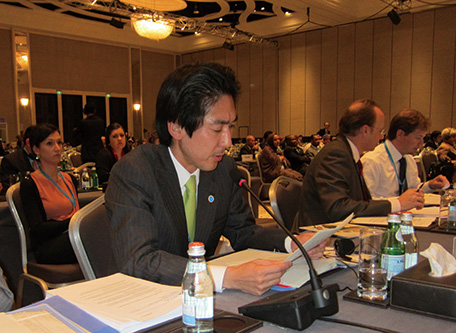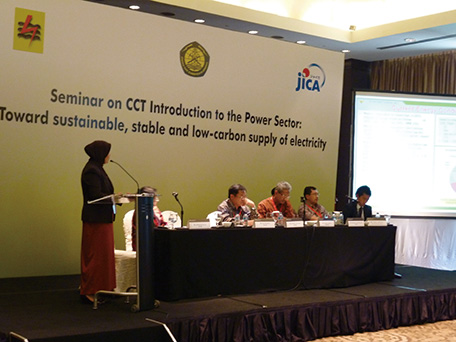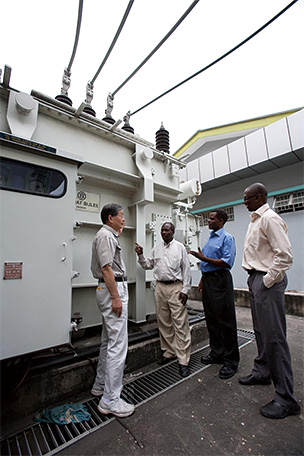Japan's Official Development Assistance White Paper 2012
(4) Resources and Energy
In developing countries, over 1.3 billion people (20% of the world’s population) have no access to electricity.(Note 12) The lack of electricity, gas and other energy services for power can delay industrial development, decrease employment opportunities, increase poverty and restrict access to medical services and education. Demand for energy throughout the world, particularly in emerging and developing countries including Asia is expected to increase, so we need a consistent energy supply and to give due consideration to the environment.
<Japan’s Efforts>
In order to secure sustainable development and energy in developing countries, Japan works on the services of modern energy supply and the stable supply of power for industrial development. In addition, Japan provides support for the establishment of an environmentally- friendly infrastructure, such as the efficiency of energy use and construction of power generation facilities that utilize renewable energy (hydropower, sunlight, wind power, geothermal power, etc.).
Japan works with resource-rich countries to enable them to acquire foreign currency through the development of their resources and to develop independently. Japan also provides aid to the resource-rich countries with establishing infrastructure in the areas around mines according to their needs.
Through these supports, Japan will enhance mutually beneficial relationships with developing, resource-rich countries. This type of assistance leads to the smooth development of resources, production, and transportation by companies, making it possible to ensure the stable supply of energy and mineral resources. It is important to proactively use Japanese ODA in the resource and energy sectors alongside support from the Japan Bank for International Cooperation (JBIC), Nippon Export and Investment Insurance (NEXI) and Japan Oil, Gas and Metals National Corporation (JOGMEC).
Japan also proactively supports the Extractive Industries Transparency Initiative (EITI), a multinational cooperative framework for increasing transparency of the flow of money in development of oil, gas, mineral resources and others by having extracting corporations report the amount of money they pay to the governments of countries that produce the resources and having governments report the amount of money they receive. Thirty-six resource-producing countries, many supporting countries including Japan, extractive corporations and NGOs are participating in EITI. They are working together to prevent corruption and conflict and encourage responsible resource development that leads to growth and poverty reduction.

Parliamentary Vice-Minister for Foreign Affairs Minoru Kiuchi speaks at the Abu Dhabi International Renewable Energy Conference.
Note 12: Source: "World Energy Outlook 2011" International Energy Agency (estimates as of 2009)
●Indonesia
Project for Promotion of Clean Coal Technology (CCT)
Technical Cooperation through JICA’s Loan Account - Project in relation to ODA Loan
(Master Plan Study) (April 2011 - July 2012)
In Indonesia, due to economic growth in recent years, demand for electricity particularly on the islands of Java and Sumatra, on which the country's population and industry are concentrated, has increased rapidly. There is an urgent need to increase power supply capacity in Indonesia. In response, the Indonesian government has established a short-term electric power development plan and is promoting the development of coal-fired power plants utilizing abundant coal in the country. Meanwhile, Indonesia is also intensifying its efforts against climate change and has indicated its intent to significantly reduce its greenhouse gas emissions by 2020. In order to achieve this, the Indonesian government is aiming to adopt clean coal technology (CCT*), which reduces negative effects on the environment by using coal efficiently and lowering greenhouse gas emissions.
Japan is advanced in the CCT field and received a request for cooperation from Indonesia. Utilizing Japan's technology, knowledge and experience, Japan has provided works on establishment of a roadmap for the introduction of CCT, developed human resources through training and education, and conducted of preliminary studies on developing a model coal-fired power plant. This cooperation is expected to help Indonesia to secure stable electric power and address climate change as well as promote the transfer of Japan's advanced technology and the export of Japan’s power infrastructure systems. (See this)
* Clean Coal Technology: Technology that enables the environmentally friendly use of coal by reducing emissions of carbon dioxide and harmful substances. CCT is used in wider activities, from coal mining to burning at the power plant and coal ash disposal.

Many private businesses participated in seminars to demonstrate recent trends of CCT adoption in Indonesia. (Photo: JICA)

JICA expert discusses training programs with counterparts in front of simulation transformers at the TANESCO Training School in Tanzania (Photo: Shinichi Kuno/JICA)
